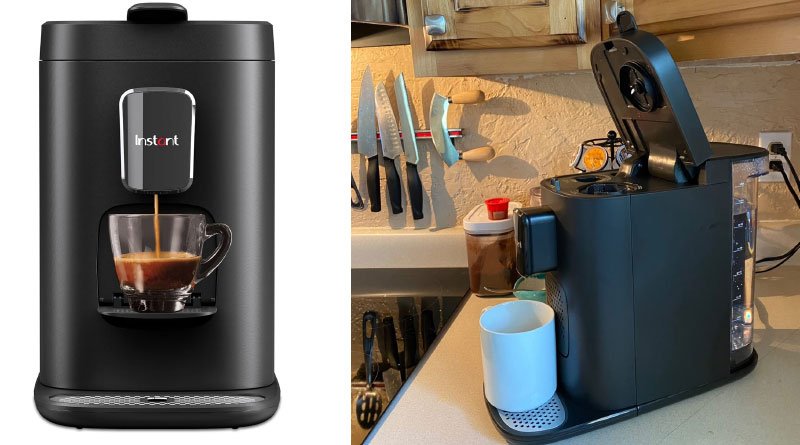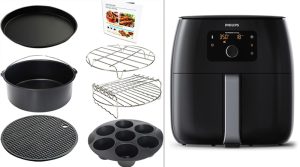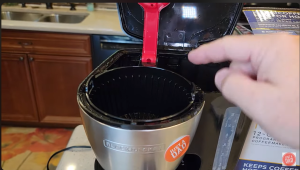Can You Put Instant Coffee in a Coffee Maker : Exploring the Pros and Cons
One intriguing question frequently arises: Can you put instant coffee in a coffee maker? The answered is Yes! You can put instant coffee in a coffee maker, but it’s not the most common or efficient method of brewing instant coffee. Instant coffee is already dissolved and does not require the use of a coffee maker to brew it, while most coffee makers brew ground coffee using hot water.
if you’re in a pinch and want a quick way to heat water for your instant coffee, you can certainly use a coffee maker to do so. Just be aware that it may not produce the best flavor compared to other methods like simply mixing instant coffee with hot water manually.
This inquiry opens the door to an exploration of unconventional brewing techniques as coffee lovers seek ways to balance the speed and simplicity of instant coffee with the familiar and ritualistic nature of the classic coffee maker. The world of coffee brewing is filled with possibilities, and enthusiasts often navigate various methods to achieve that perfect cup.
For busy coffee lovers, brewing a fresh cup each morning is a delightful yet time-consuming prospect. Conversely, the convenience of instant coffee is hard to beat when time is of the essence. But what if you could combine the rapid preparation of instant coffee with the beloved ritual and nuanced flavor that comes from using a coffee maker?
Can You Put Instant Coffee in a Coffee Maker: Things to Consider
For many coffee enthusiasts, the debate over instant coffee versus freshly brewed has been ongoing. However, a rising question among individuals looking for a quick caffeine fix is whether it’s possible to incorporate instant coffee into a traditional coffee maker. This article dives into the heart of this inquiry, helping you decide if taking this unconventional route is right for you.
Coffee Maker Compatibility: When pondering using instant coffee in a coffee maker, you must first consider the coffee maker you have at home. While technically, you can mix instant coffee with hot water in most machines, drip coffee makers and single-serve units are your best bets due to their straightforward compatibility. However, percolators and siphon brewers might not be the best match, as they don’t cater to instant coffee’s fine granules, potentially leading to inconsistent results and clogging issues.
 Are you looking for a coffee maker that offers high quality?
Are you looking for a coffee maker that offers high quality?the best coffee maker under 50 that are sure to satisfy your caffeine cravings.
Taste and Quality: Instant coffee’s hallmark is convenience, not taste. Instant coffee granules are made from coffee beans that have been roasted, ground, and brewed, but some may notice a decline in flavor compared to freshly ground coffee. The brewing method can significantly impact the taste and overall quality. When brewed in a coffee maker, instant coffee may produce less richness and complexity than a true aficionado craves.
Brewing Process: The beauty of traditional brewed coffee lies in the meticulous process of extracting the flavors through a precise combination of temperature and time. By contrast, instant coffee quickly dissolves in hot water, leaving no grounds for substantial brewing. Using a coffee maker with instant coffee eliminates some nuances associated with the brewing process, but it’s an efficient way to fix your caffeine if time is of the essence.
Convenience and Time-saving: One of the allure of using instant coffee in a coffee maker is convenience and time-saving. For the busy professional or those in urgent need of caffeine, the ability to pop in a scoop of instant coffee, add water, and press a button can be a game-changer. It’s a simple process that requires less clean-up and can be completed hands-free, even in the groggy early morning hours.
Alternative Brewing Methods: If you’re hesitant to try instant coffee in your coffee maker or looking to explore other avenues of use, several alternative brewing methods can elevate your instant coffee experience. Techniques like the pour-over method or plunging a French press can enhance flavor extraction from your instant coffee, giving you an enjoyable and quicker brew than traditional coffee brewing.
Pros and Cons of Using Instant Coffee in a Coffee Maker
The central question is whether instant coffee – a granular powder – can be substituted for the ground coffee typically used in a coffee maker. The answer is a cautious yes, but with considerations:
Pros of Using Instant Coffee in a Coffee Maker
Faster Brewing: It combines the unprecedented speed of instant coffee with the automation of a coffee maker, perfect for the on-the-go individual.
Consistency: Instant coffee, when used properly, can provide a consistent taste and strength, as the amount is easily measured and controlled.
Cons of Using Instant Coffee in a Coffee Maker
Flavor and Aroma: The brewing process of a coffee maker is designed for grounds, which may result in a loss of flavor and aroma with instant coffee.
Maintenance Woes: The fine particles in instant coffee can lead to clogging and, over time, affect the machine’s performance.
Alternatives to Instant Coffee in a Coffee Maker
While the idea of using instant coffee in a coffee maker is intriguing, it’s essential to note that there are numerous alternatives to achieve a swift yet freshly brewed cup of coffee:
Single-Serve Pods: These compromise speed and quality, using pre-measured and sealed portions of ground coffee designed for the specific machine.
Pour-over Method: This simple manual process involves pouring hot water over ground coffee in a filter, allowing for precision and control over the brewing time.
Aeropress: A device that brews coffee by forcing water through the ground coffee, producing a smoother, more concentrated coffee often likened to espresso.
Coffee Makers and Their Functionality: From Drip to Press
Coffee makers come in various designs, from the iconic drip coffee machines to the more nuanced espresso and French press brewers. Regardless of their intricacies, coffee makers are engineered to extract the aromas and flavors from ground coffee by passing hot water through it. The result is a brewed beverage that’s as much about the process as the product. Each type of coffee maker is designed to cater to different needs and preferences:
Drip Coffee Makers: Most common in households, they quickly brew a large pot of coffee with minimal user involvement.
Espresso Machines force water through the finely ground coffee at high pressure, producing a more concentrated and robust flavor.
French Press: Operates by steeping coffee grounds in hot water and pressing the grounds out before serving, providing a full-bodied cup.
Make Instant Coffee Using a Coffee Maker
If you’re determined to try using instant coffee in your coffee maker, here’s a simple step-by-step guide to follow:
Gather Your Supplies: You’ll need instant coffee, a coffee maker, a coffee filter, and fresh water.
Measure Out Your Coffee: Depending on how strong you like your coffee, you’ll want to measure out your instant coffee. A general rule of thumb is one to two teaspoons per six ounces of water.
Add Coffee to Filter: Place your coffee filter in the basket of your coffee maker. Then, add your measured instant coffee to the filter.
Add Water: Fill the coffee maker’s water reservoir with fresh water. Make sure to use the correct amount for the amount of coffee you’re making.
Start Brewing: Turn on your coffee maker and let it brew. This usually takes a few minutes.
Serve and Enjoy: After the brewing process, carefully pour your coffee into a mug. Add any extras you like, such as sugar or cream, and enjoy your instant coffee made with a coffee maker!
Instant coffee is already brewed coffee that has been freeze-dried or spray-dried into a soluble powder, so using a coffee maker to rehydrate it might give you different results than freshly ground coffee beans. Making coffee can still be convenient and quick, especially in a hurry.
Final Verdict
whether you can put instant coffee in a coffee maker sparks curiosity and experimentation in the ever-evolving world of coffee brewing. While the convenience of instant coffee might seem appealing, the nuances of using it in a traditional coffee maker come with considerations.
The decision to use instant coffee in a coffee maker comes down to personal preference and your value on convenience versus taste. If you enjoy your coffee slowly, savoring the aromas, and indulging in a flavor-rich cup, sticking with fresh is essential.
FAQs of Using Instant Coffee In A Coffee Maker
Q: What happens if I put instant coffee in a coffee maker?
A: Putting instant coffee in a coffee maker may clog the machine and lead to its malfunction. This is because instant coffee is designed to dissolve directly in hot water and not need to be filtered or brewed.
Q: Can I use instant coffee in a coffee maker instead of ground coffee?
A: No, you cannot use instant coffee in a coffee maker instead of ground coffee. Ground coffee is designed explicitly for brewing in a coffee maker, while instant coffee is designed to dissolve directly in hot water.
Q: How can I use instant coffee without a coffee maker?
A: To use instant coffee, all you need is hot water. Add the recommended instant coffee to your cup, pour hot water over it, stir until the coffee is dissolved, and enjoy!
Q: Instant coffee vs. coffee made from a maker: does it taste different?
A: Yes, there is a significant difference in taste. Coffee brewed from a coffee maker using ground beans generally has a fresher and more robust flavor. On the other hand, instant coffee tends to have a more mild and less complex flavor profile.
Q: Why is my coffee maker not suitable for instant coffee?
A: Coffee makers are designed to heat and filter water through ground coffee beans. Instant coffee, already a product of brewing and dehydration, does not require this process and may damage the coffee maker due to its fine, dissolvable consistency.







